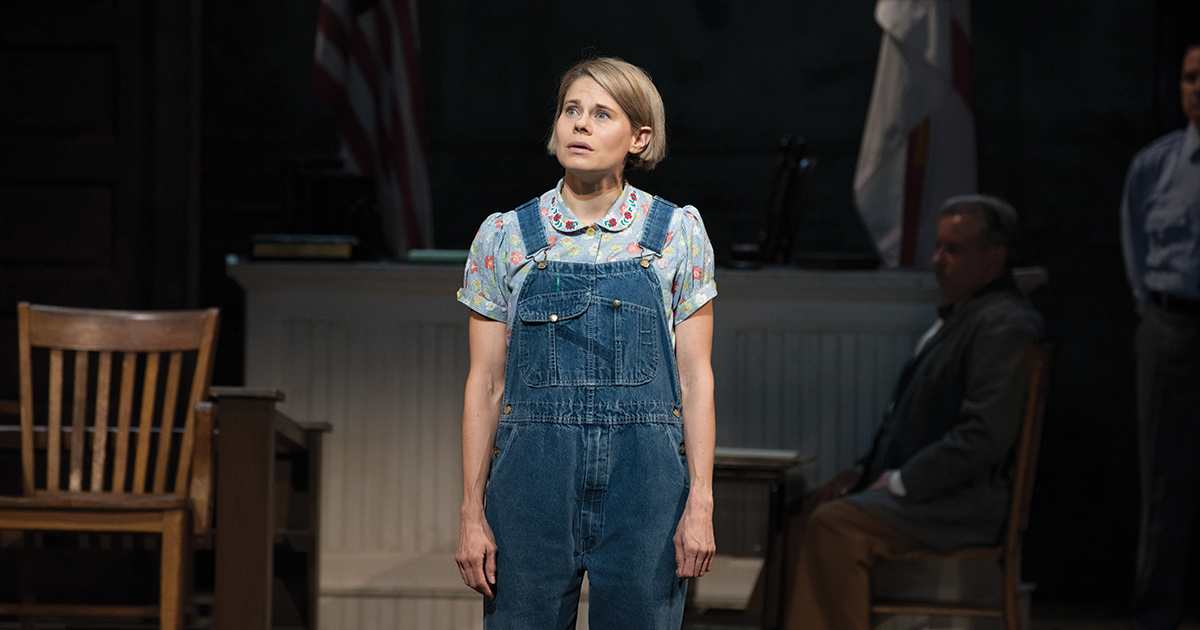The Tony Award-nominated actress Celia Keenan-Bolger is appearing in the new Broadway production of “To Kill a Mockingbird” as Scout, a role her life has been readying her to play.
Celia Keenan-Bolger, ’00, is 8 years old. Sitting in a dressing room in the basement of the Lincoln Center Theater, she is avid, scrappy. Her voice is a bell that goes ding, ding, ding as her sternum thrusts so far forward that she practically tumbles out of her chair. Then, her voice mutes, her shoulders drop, and there she is again, a 40-year-old woman. It’s a magic trick—no wand required.
It is an early afternoon in October during the first weeks of rehearsal for the Broadway production of “To Kill a Mockingbird,” opening Dec. 13 at the Shubert Theatre. Adapted from Harper Lee’s book by Academy Award winner Aaron Sorkin and directed by Tony Award winner Bartlett Sher, the story is set in the fictional town of Maycomb, Alabama, in 1935. The plot follows a white lawyer, Atticus Finch (played by Jeff Daniels), as he defends a young black man against an accusation of rape.
In this version, Atticus’s daughter Scout—an open-heart and closed-fists creature whom Keenan-Bolger plays—appears both as a child experiencing these events and as an adult reflecting on them years later as a writer. This October afternoon, Keenan-Bolger is working with the dialect coach Kate Wilson, learning the melodic vowels and elided consonants of the mid-20th century South, discovering how to mature from a girl to a grown woman in an instant.
Keenan-Bolger has been growing up onstage for a long time. A professional actress since high school, she has specialized in what she calls “vulnerable young women.” There was Clara in “Light in the Piazza,” Olive in “The 25th Annual Putnam County Spelling Bee,” Éponine in a “Les Misérables” revival, Molly in “Peter and the Starcatcher,” Emily in “Our Town,” and Laura in “The Glass Menagerie.”
Scout, one of the great heroines of American letters, is the latest in that lineup and arguably a character her life has been readying her to play. When it came time to cast the role, director Sher says, “The only person I came up with was Celia. She has an extraordinary combination of skills that you find in almost no other artist, an enormous heart hooked up to an incredible sense of intelligence and integrity.”
Keenan-Bolger grew up in Detroit, the oldest of three children born to a public school teacher (her mother) and urban planner. Her sister, Maggie, is a playwright and activist as well as an actress, and her brother, Andrew, also a Broadway actor. Keenan-Bolger started this sibling trend when she fell in love with the stage in kindergarten. Her parents took her to see a children’s theater production of “The Sound of Music,” and she thought, “I want to do that.” By the time she was 6 years old, she performed in “Annie Get Your Gun.”
That set her on a course for life. She acted in children’s theater and community theater, and eventually attended the Detroit High School for the Fine and Performing Arts (now the Detroit School of Arts), appearing in “Bye Bye Birdie” and “Don’t Bother Me, I Can’t Cope.” She also did a quick stint in 1994 in the off-Broadway show “Kindertransport.”
When her dream school, the conservatory at Carnegie Mellon University, accepted her with a scholarship, she went to visit. She watched the students performing Stephen Sondheim’s “Assassins,” a production that fit her taste, but then some part of her rebelled. “I don’t think this is the place that I am supposed to be,” she remembers thinking. To belong, she felt she might have to become someone fancier, more fabulous.
She then visited U-M in the fall of 1995. Though she saw a dreary production of “Oh! Coward,” she met a group of lively drama students, including Tony Award winner Gavin Creel, ’98, who to this day remains one of her closest friends. “I felt more like myself at U-M with these people,” she says.
Creel remembers meeting her for the first time on the front porch of his shared house. “There was a real openness and curiosity to Celia that is still kind of her benchmark,” he says, “not only as a performer, but also as a person.” Several months later, the summer before her freshman year, he met her again when she auditioned for a production of “She Loves Me”; for the first time, he heard her sing. “Her talent sort of did not match up with her years,” he recalls. “She was so tiny. She still is so tiny. But there was a power that came out of her, an honesty that kind of radiated out of her.”
At U-M, she majored in musical theater but also studied Shakespeare and Chekhov. And it shows. She has always acted her musical theater roles as much as she has sung them, which is not as common as it might seem.
The summer after she graduated from U-M, Keenan-Bolger appeared in the musical “Summer of ’42” at the Goodspeed Opera House in Connecticut and was promptly cast in regional productions of “Light in the Piazza,” directed by Sher. But before the show moved to Broadway, he fired her. (“One of the most difficult things I ever went through,” says Sher.) Keenan-Bolger has never asked exactly why Sher let her go but thinks it had something to do with her voice. “I remember thinking, ‘I’m never going to recover from this. I’m never going to get a job.’”
Fortunately, “Spelling Bee” was waiting for her and then “Les Miz.” If she has been out of work since, it has not been for long. Audiences love her and seeing her onstage explains why. The lights hit her face and it feels like you know her.
“She radiates empathy. She is sensitive and kind and thoughtful, and it comes across the footlights in an obviously huge way,” says the director Alex Timbers, who worked with her on the Tony Award-winning play “Peter and the Starcatcher.” Trip Cullman, who directed her in several productions, adds, “Her absolute unbelievable worth as a human being is also what makes her a good actress.”
For a long time, girls—wounded, searching, singing—were pretty much her remit. In her late 20s, she started to feel like she “was cycling through a similar brand of lady.” At the same time, the pressure to sing eight times a week had become stressful, so she made a move toward straight plays. Though she was still playing girls, some of the characters, like Katie in “Bachelorette” and Varya in “Cherry Orchard,” had hard edges.
In the meantime, she met the actor John Ellison Conlee, who is now starring on Broadway in “The Nap.” A few years later, they married and together have a son, William, who is 3 years old. Now a mother, Keenan-Bolger thought she was finally done playing girls. “But I’m about to start playing a kid again,” she says, seated in her cozy, cluttered apartment near Union Square with William romping on the carpet beside her. “Do I have complicated feelings about playing a kid?” she asks. “Yes.”
Of course, Scout isn’t just any kid. And Keenan-Bolger isn’t only a kid in the play. The 8-year-old version of Scout is younger than Keenan-Bolger has ever played on stage and the 40-year-old version of Scout is a rare opportunity for her to play a part that is close to her own age. That makes Scout both a familiar, comfortable kind of role and an enormous stretch. It’s a role that dovetails in ways both reassuring and poignant, with her own life.
Like Scout, Keenan-Bolger is the politically committed daughter of politically committed parents. (A former political organizer, she now works closely with the New York Civil Liberties Union and organizes fundraisers for the Democratic Legislative Campaign Committee.) Like Scout, she also lost her mother at a young age. (Keenan-Bolger’s mother passed away when she was in college.) And like Scout, she is a mix of keen intellect and fierce emotion, with a bright streak of mischief.
Keenan-Bolger does not usually do dedicated research for her roles, but late last summer she and William took a trip to Monroeville, Alabama, the home of Harper Lee. She meant the trip to be investigative, analytical, but it felt more spiritual, a chance to walk Lee’s streets, to feel what her life had been. Given the acting challenge ahead of her, it was a moment to try to layer the girl into the woman and build the woman toward the girl.
A few weeks after the sit-down in her apartment, Keenan-Bolger was already feeling her way into the role. Over coffee at the Film Society of Lincoln Center, she ruminated on her character, wondering, “Why can women at the age of 8 be like, ‘I’m ready for the world!’ And then by the age of 40 are like, ‘I’ve had to mitigate all kinds of parts of myself so that I can get into a version of what society expects me to be.’”
Scout—with all her pluck and decency—seems made for Keenan-Bolger. Or maybe it’s the other way around, though Keenan-Bolger herself would never go that far. A staunch Midwesterner, she is not big on hyperbole. But it does sometimes feel that her life, all 40 years of it, has been leading her toward this girl. “I don’t know if I was born to play this part,” she says. “But I’ve been waiting for it a very long time.”
1987
Born in Detroit, Keenan-Bolger acted in her first show at just 6 years old. By age 9, she had landed the lead role in “Alice in Wonderland” with the Grosse Pointe Children’s Theater.
1991
The young actress, dressed in the role of Anybodys in “West Side Story,” posed with her sister, Maggie, (now a playwright) and brother, Andrew, (also a Broadway actor).
1993
While attending the Detroit High School for the Fine and Performing Arts, she played the part of Rosie in the musical “Really Rosie” for a local community theater group.
1999
At U-M, she performed in “A Little Night Music” along with Jason Potter, ’00.
2000
In her last leading role as a musical theater student, the soon-to-be graduate played Sally Bowles in “Cabaret.” Five years later, she would receive a Tony Award nomination for her debut Broadway performance in “The 25th Annual Putnam County Spelling Bee.”
2011
She received her second Tony Award nomination for the role of Molly in “Peter and the Starcatcher,” following the transfer of the New York Theatre Workshop production to Broadway.
2013
Playing the role of Laura in the American Repertory Theater’s production of “The Glass Menagerie,” she earned her third Tony Award nomination following the production’s move to Broadway.
2016
In the Broadway revival of Anton Chekhov’s play “The Cherry Orchard,” the actress had to portray the hard edges behind the character Varya.
Alexis Soloski is a theater critic for The New York Times and a contributor to The New Yorker.





